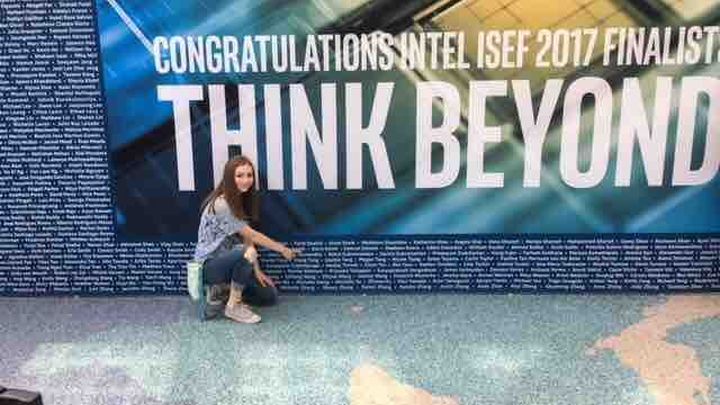
It Takes Guts
Donation protected
 
Hi, my name is Elora Smith. I am a junior at Sargent High School in a little town in Colorado called Monte Vista. When I was in elementary school, I was diagnosed with a learning disability and told me that I would never be as smart as the other kids in my class. This stigma soon was the pillar of my desire to work harder and be the best I could be every day. I strived beyond my learning disability and dreamed of achieving the impossible. You see, I am a very curious person. I have always asked questions and fight to seek the absolute truth. I also love kids and believe that every single one of them can make a difference. This is something that I have always been passionate about, and I know that whatever I do when I grow up, it will be centered on kids. I also love science because it gives me the ability to do something about all these questions I have about the world. I became passionate about science while participating in my first science fair in 5th grade, and I have been a part of the science fair ever since. I vowed to myself that even if I fail and don’t win anything, that I would never give up on pursuing the wonders of science. This year for the science fair, I am continuing to pursue an idea that I was told would never be able to be done because of the lack of resources in my area. However, I took the challenge and pursued it anyway. I was then selected to attend the 2017 International Science and Engineering Fair (ISEF). The project that took me to ISEF was testing the gut bacteria in atopic children compared to children who are considered healthy. This project was and is very important to me. I have put a lot of effort and hard work into.
Where I live, I see several children suffering from atopic diseases. These children are not able to do sports, go outside in the summer or especially the fall because it’s harvest season. Also many can’t go hiking because they can’t catch their breath. Throughout this project, I found a significant difference in the gut bacteria. The children with atopic diseases had a very unbalanced gut compared to children considered healthy. There was also a difference in the bacteria seen. In my atopic group, there were participants with unique types of bacteria. For example Pseudomonas, different types of Citrobacter, Bacillus Stabiles, and so on. Even though this project went to internationals, the judges said it was a classic old way of testing the bacteria in the gut, and overall is not substantial evidence to indeed support my hypothesis. This being said, I am still proud of what I accomplished with my limited resources. However, there are new and better ways to see if there is a real difference in the gut bacteria between people with disease and people who are healthy. This is exciting to me but also scary, again due to limited resources.
For my next research project, I want to change the bacteria found in children with illness, into healthy, balanced bacteria. I want to genome sequence stool samples for this atopic group of children. Then, over a series of time, I want to take the information I collect in my data to help guide what probiotics my participants will need to add to their daily diet to see if that helps their gut bacteria balance out. I hope that this study will improve my participant's lives, and in time cure their illness. This project will change lives and will be groundbreaking research. Healthcare is forever evolving, changing, and becoming better and I want to be a part of that. Achieving this project can get me one step closer to being a part of that change.
What am I asking from you?
Like I mentioned above, I live in a rural area, I don't have a lot of resources. Over the past year, I have been trying to find a lab in Colorado that does genome sequencing. After hearing a no from every single one of them, I reached out to a lab in California that helped me a little in understanding genome sequencing. However, they could not help me test my sample. I decided that If I couldn’t get a lab to sequence the samples I needed to figure out a way to get a sequencing device in my hometown lab. Oxford Nanopore Technologies has been helping me ever since. They have helped support me by providing a mentor as well as financially supporting me as much as they can. To keep this project going and make it possible, I still need some funding. I am hoping that anyone who reads this message will find it in their heart to donate as much as they can, even if it's just your prayers. Thank you, everyone, and have an amazing day!
Project Cost Breakdown:
Sequencing Test (includes sample kits, analyzing data, interpreting data): 12,000
Probiotics: 1,500
Organizer
Elora Smith
Organizer
Monte Vista, CO